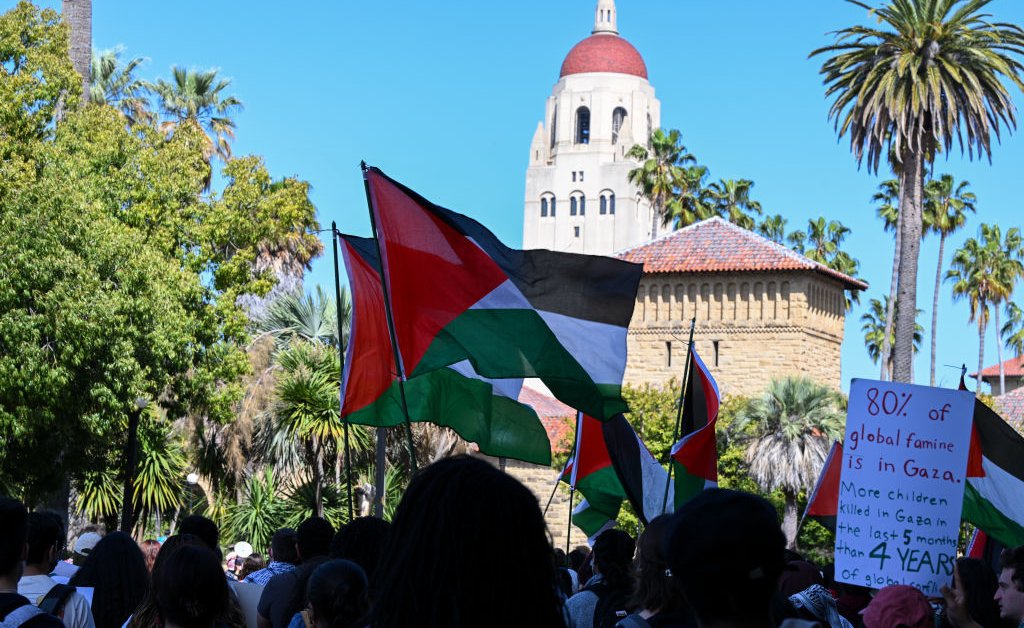Stanford University’s student newspaper is suing the Trump Administration over what it says is the government’s attempts to target international students for immigration actions over the expression of pro-Palestinian views.
The Foundation for Individual Rights and Expression filed the lawsuit Wednesday in federal court in San Jose, Calif., on behalf of the Stanford Daily, as well as two unnamed former students. Secretary of State Marco Rubio and Homeland Security Secretary Kristi Noem are named as defendants. A spokesperson for Stanford University told Reuters that the student newspaper is an independent organization and that the university is not involved in the lawsuit.
“In the United States of America, no one should fear a midnight knock on the door for voicing the wrong opinion,” Conor Fitzpatrick, an attorney at FIRE, said in a statement. “Free speech isn’t a privilege the government hands out. Under our Constitution it is the inalienable right of every man, woman, and child.”
The lawsuit has requested a preliminary injunction to block the government from attempting to deport students over pro-Palestinian speech while the case is ongoing. “Secretary of State Marco Rubio and the Trump administration are trying to turn the inalienable human right of free speech into a privilege contingent upon the whims of a federal bureaucrat, triggering deportation proceedings against noncitizens residing lawfully in this country for their protected political speech regarding American and Israeli foreign policy,” the complaint says.
The Stanford Daily was previously on the losing end of a Supreme Court case in 1978 over the search of its offices and seizure of evidence related to a crime—a protest demonstration where police officers were injured—that it had reported on but was not criminally involved in. That case ultimately led to Congress’ passage in 1980 of the Privacy Protection Act, which protects journalists in such cases.
Here’s what to know about the new case and why the newspaper is once again hoping to defend not just its own student writers but a wider class of people whose rights it believes are being infringed.
Targeting of foreign students
The Trump Administration has used two provisions in the Immigration and Nationality Act of 1952 to target foreign-born students and censor pro-Palestinian speech, according to the lawsuit. The first provision, known as the Deportation Provision, gives the Secretary of State the authority to deport a noncitizen if he “‘personally determines’ their lawful ‘beliefs, statements, or associations’ ‘compromise a compelling United States foreign policy interest,’” the lawsuit states.
Rubio cited the provision to justify the attempted deportation of Palestinian Columbia graduate student Mahmoud Khalil, who had acted as a liaison between student protestors and university administrators during pro-Palestinian student demonstrations in 2024, and was arrested by immigration officers on March 8. In an April memo to an immigration judge overseeing Khalil’s case, Rubio said that although Khalil’s “past, current or expected beliefs, statements, or associations … are otherwise lawful,” the Deportation Provision allows Rubio to “personally determine” whether Khalil should be allowed to remain in the U.S. (Khalil was released from custody in June, and in July his attorneys filed for a preliminary injunction challenging the government’s attempts to deport him on a separate immigration charge that alleges he misrepresented himself on his green card application).
The second provision, known as the Revocation Provision, allows the Secretary of State to revoke a visa or documentation at his discretion. The Trump Administration has used this provision to revoke the visa of and detain Tufts University Ph.D. student Rumeysa Öztürk, who had co-authored a pro-Palestinian op-ed in the Tufts Daily before her detention and has since been released.
“We gave you a visa to come and study and get a degree, not to become a social activist that tears up our university campuses,” Rubio told reporters in May. “If we’ve given you a visa and then you decide to do that, we’re going to take it away.”
The complaint argues that both provisions are unconstitutional when applied to protected speech: “The First Amendment cements America’s promise that the government may not subject a speaker to disfavored treatment because those in power do not like his or her message. And when a federal statute collides with First Amendment rights, the Constitution prevails.”
The plaintiffs argue that the government’s deportation threats and actions have amounted to violations of First Amendment rights. Since March, noncitizen writers of the Stanford Daily have declined to cover pro-Palestinian protests and asked to remove previous articles on the topic, fearing that such reporting could jeopardize their legal immigration status, according to the lawsuit.
“There’s real fear on campus and it reaches into the newsroom,” Greta Reich, the student newspaper’s editor-in-chief, said in a statement. “I’ve had reporters turn down assignments, request the removal of some of their articles, and even quit the paper because they fear deportation for being associated with speaking on political topics, even in a journalistic capacity. The Daily is losing the voices of a significant portion of our student population.”
The Trump Administration has also cracked down on international students more broadly. In April, the government quietly revoked the visas of thousands of students who had allegedly committed minor legal infractions before abruptly reversing the policy. The Administration has also used international students as a bargaining chip to compel university administrations to comply with certain demands, such as by attempting to revoke Harvard University’s authority to enroll international students. And the government has heightened its scrutiny of student visa applicants, including vetting applicants’ social media profiles for “a history of political activism.”
The Trump Administration’s response
“DHS doesn’t arrest people based on protected speech, so the plaintiffs’ premise is incorrect,” DHS spokesperson Tricia McLaughlin said in a statement to media outlets. “DHS takes its role in removing threats to the public and our communities seriously, and the idea that enforcing federal law in that regard constitutes some kind of prior restraint on speech is laughable.”
A bench trial challenging the Trump Administration’s alleged “ideological deportation” policy concluded last month and a final ruling is expected this or next month. That lawsuit was filed by the American Association of University Professors and the Middle East Studies Association. During the course of the trial, a government memo unearthed in court revealed that officials had warned Rubio about potential legal scrutiny of deportation attempts because their basis could be considered constitutionally protected speech.
“Anyone who has any position that is against what the American government says they should think, they’re immediately ‘anti-American,’” David Rozas, an immigration attorney who represented Alireza Doroudi, an Iranian student who was detained for weeks and ultimately chose to self-deport, told TIME in May. “America was built on discourse,” he added. Trump’s immigration agenda, he said, is “going to stifle American growth and the American dream.”
“225 years after the Alien Friends Act expired, the danger of nighttime raids on noncitizens for perceived thoughtcrime is reality once more. Secretary Rubio and the Trump administration’s war against noncitizens’ freedom of speech is intended to send an unmistakable message: Watch what you say, or you could be next,” the complaint says. “Message received.”







